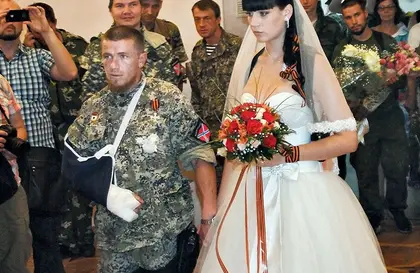Russian mercenary Arseniy Pavlov, better known as Motorola, was killed in an explosion in Donetsk on Oct. 16. Separatist authorities confirmed Pavlov’s death. Denis Pushilin, the speaker of the separatists’ parliament in Donetsk, called the killing a “terrorist act” and blamed Ukrainian forces. Alexander Zakharchenko, the head of the self-proclaimed republic, echoed Pushilin, calling the killing a “declaration of war” by Kyiv.
Pavlov was killed when an improvised explosive device detonated in the elevator of his apartment building. Previous attempts had been made on Pavlov’s life. He is just the latest in a growing number of separatist military leaders to be assassinated in the Donbas, in a spate of killings that the separatists blame on Kyiv but many others think Moscow is responsible for.
Pavlov was a war hero to Russian President Vladimir Putin and a war criminal to Ukraine.
In an interview with the Kyiv Post on April 3, 2015, when asked about allegations that he had murdered Ukrainian prisoner of war Ihor Branovytsky in January, Pavlov admitted to killing 15 prisoners in a recorded interview. “I don’t give a f*** about what I am accused of, believe it or not. I shot 15 prisoners dead. I don’t give a f***. No comment. I kill if I want to. I don’t if I don’t,” he said.
Motorola confesses to murdering 15 Ukrainian prisoners in interview with the Kyiv Post on April 3, 2015.
Behind the violence was a world view of a Russian imperialist who gained military experience during the Second Chechen War in Russia. He believed Russia was fully justified in attacking Ukraine.
Motorola, 33, was born in Russia’s Komi Republic and also reportedly used to live in Rostov-on-Don. Previously he had a blue-collar job and worked as a lifeguard.
Motorola’s experience fighting in Chechnya came in handy when Russia launched its war against Ukraine by seizing administrative buildings in Crimea in February 2014.
“I took a train and came here, I didn’t go into the details,” Motorola told Zavtra, commenting on his decision to come to Ukraine. “There are Russians here, that’s why I came. I’ve already said that, when Molotov cocktails started being thrown at the police on Maidan (during the 2013-14 EuroMaidan Revolution that ousted President Viktor Yanukovych), it became clear to me that it’s a war.”
He wore medals given by Russian President Vladimir Putin for the “return and protection of the (Crimean) peninsula,” according to footage broadcast by Russian television channel Rossiya-1.
The next step in Motorola’s career was Russian-backed unrest in Kharkiv – something that was portrayed by Kremlin propaganda as a grassroots uprising by locals but also turned out to be coordinated by Russians.
Motorola said in a YouTube video that he took part in clashes between pro-Russian and pro-Ukrainian activists on March 14, 2014 in Kharkiv. Meanwhile, a YouTube video shows Motorola attending a pro-Russian rally in Kharkiv on March 16, 2014.
In April 2014, the Russian militant proceeded to fight in Donetsk Oblast’s Sloviansk after it was seized by Igor Strelkov, another Russian citizen and ex-officer of Russia’s Federal Security Service, the successor to the Soviet KGB. Following the withdrawal of Russians and their proxies from Sloviansk in July, Motorola was appointed by Kremlin-backed forces as the “people’s mayor” of Donetsk. His next mission was Illovaisk in Donetsk Oblast, where hundreds of Ukrainian troops were massacred after Russian regular troops invaded Ukraine in August.
Motorola’s ascendance continued at Donetsk Airport, where his Sparta Battalion played a major role in fighting and ultimately taking over what was left of the hollowed airport in January 2015.
The militant’s family life is controversial, since he has been accused of bigamy. In June 2014 he said he had a wife and a 5-year-old son in Russia. This did not prevent him from marrying a resident of Sloviansk in July, though there is no evidence that he got divorced with the first wife.
Alexander Zakharchenko, the current leader of separatists forces in Donbas, accused Kyiv of breaking a ceasefire and threatened escalation in Donetsk.
“As I understand, Poroshenko declared war, so wait,” Zakharchenko was quoted as saying during the meeting with the journalists on Oct. 16, following the news on Motorola’s killing.
You can also highlight the text and press Ctrl + Enter



